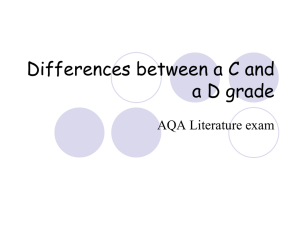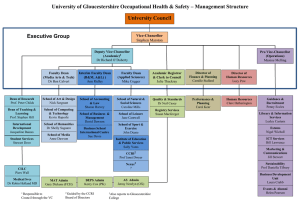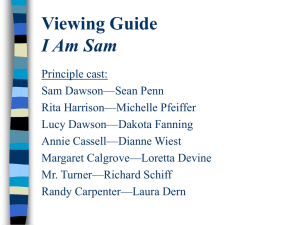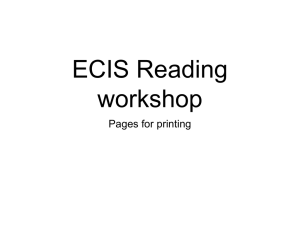Overindulgence - Pierce County - University of Wisconsin
advertisement
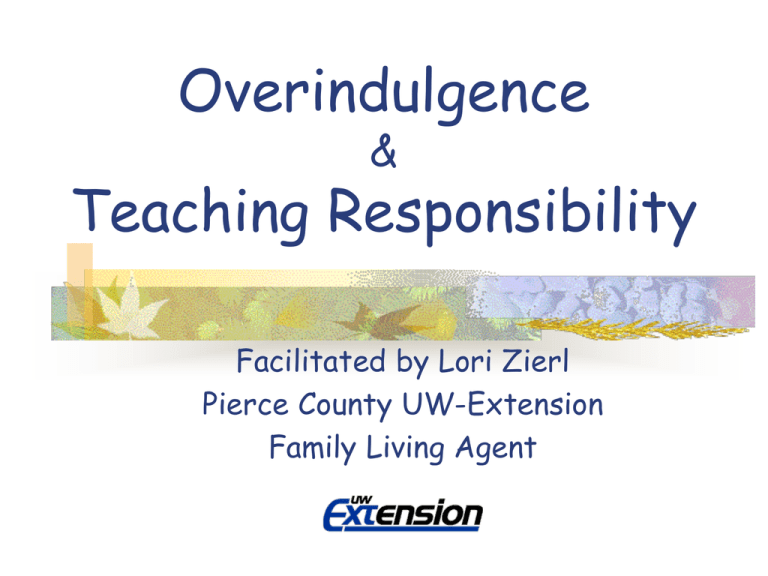
Overindulgence & Teaching Responsibility Facilitated by Lori Zierl Pierce County UW-Extension Family Living Agent What Is Overindulgence? Giving children too much, too soon, too long Giving things or experiences that are not appropriate for their age, interests and talents Giving things to children to meet the adult’s needs, not the child’s needs 2 What Is Overindulgence? (Continued) Giving a disproportionate amount of family resources to one or more children Children experience scarcity in the midst of plenty 3 What Is Overindulgence? (Continued) Overindulgence is doing or having so much of something that it does active harm or at least stagnates and deprives that person of achieving their full potential 4 What Is Overindulgence? (Continued) Overindulgence is a form of child neglect It hinders children from doing their developmental tasks, and from learning necessary life lessons (How Much is Enough? by Clarke, Dawson & Bredehoft) 5 Are You Overindulgent? Do you suspect that you might be overindulging your children? 6 Overindulgence Undercuts self-discipline 7 Clues to Overindulgence Hinders child from learning tasks that support development and learning Gives disproportionate amount of family resources to one or more of the children Benefits adult more than child Child’s behavior potentially harm others, society, or the planet in some way (How Much is Enough? by Clarke, Dawson & Bredehoft) 8 Hazards of Overindulgence Trouble learning delayed gratification Trouble giving up being the center of attention Trouble becoming competent in: Everyday skills Self-care skills Skill of relating to others 9 Hazards of Overindulgence (continued) Trouble taking personal responsibility Trouble developing a sense of personal identity Trouble knowing what is enough Trouble knowing what is normal for other people (How Much is Enough? by Clarke, Dawson & Bredehoft) 10 What is Enough? Too Little Enough Abundance Too Much 11 Who Overindulged? Both parents Mom Dad Grandmother 43% 42% 11% 4% (How Much is Enough? by Clarke, Dawson & Bredehoft) 12 How Were Children Overindulged? 53% 41% 36% 35% 32% 32% Having things done for child Clothes Privileges Toys Allowed to dominate family Not having to learn skills that were expected of other children (How Much is Enough? by Clarke, Dawson & Bredehoft) 13 Reasons Parents Overindulged 49% Issues stemming from the parent 18% Death of a loved one 15% Illness 10% Birth order (How Much is Enough? by Clarke, Dawson & Bredehoft) 14 Areas of Overindulgence Too many things Over-nurturing Soft structure 15 Too Many Things Clothes Toys Lessons Entertainment Holidays 41% 35% 22% 18% 17% (How Much is Enough? by Clarke, Dawson & Bredehoft) 16 Too Many Clothes “I’ve got nothing to wear.” 17 Too Many Toys Children’s play is children’s work Are today’s toys merely preparing children to become consumers? 18 Too Many Activities “Many families are over-scheduled outside the family and underscheduled inside the family.” (The Intentional Family by William Doherty) 19 Look For Balance 20 What is Nurturing? All the ways we provide for the soft needs’ love, touch, warmth, attention, support, stimulation, recognition and response 21 Over-nurtured Adults Say… Parents did things for me that I should have done myself Parents gave me too much attention I was allowed lots of privileges Parents made sure I was entertained (How Much is Enough? by Clarke, Dawson & Bredehoft) 22 Too Much Over-nurturing Nurturing becomes overindulgence when it involves doing things for children they are able to do, and should be expected to do, for themselves 23 Over-nurturing When parents over-function for a child able to function for herself, the child tends to under-function 24 What is Structure? Structure is the firm side, the “how to” of care It’s the bones 25 Overindulged Adults Say… Parents did not expect me to do chores Not expected to learn same skills as other children Parent’s didn’t have rules or make me follow the Parents gave me too much freedom (How Much is Enough? by Clarke, Dawson & Bredehoft) 26 Too Soft Structure No rules Not enforcing the rules No chores Too much freedom Allowed to dominate the family 27 Why is Soft Structure a Form of Overindulgence? Children fail to learn important life skills They do not learn how to set and respect boundaries 28 What is Firm Structure? Reasonable rules that are consistently enforced Mastery of skills Learning family values 29 How to Establish Structure Set limits, boundaries, and standards with rules Enforce the rules with rewards for compliance and discomforting consequences for noncompliance 30 What is a Rule? “A principle or standard to which an action conforms.” 31 Chores The expectation that a child will do chores lets a child know that he is valued as a contributing member of the family 32 Too Much Freedom Scary for an inexperienced child Expects children to handle people and situations without having learned how to do so safely or responsibly 33 Good Freedom Allows children to explore or experiment within the bounds of safety and their abilities Allows for learning important lessons from experience Allows for creativity without destruction 34 How to Develop Responsibility in Children Be a responsible person (role model) Communicate expectations clearly Allow children to be involved 35 Developing Responsibility (Continued) Offer encouragement, love, and attention Let children know you believe in them Present task in a way that fits your child’s learning styles 36 Developing Responsibility (Continued) Responsibility should be age appropriate Allow for consequences Children should not be given an allowance for chores 37 Developing Responsibility (Continued) Allow for mistakes and imperfections Set limits and give fewer choices if a child repeatedly fails to fulfill his responsibilities Don’t set your child up to rebel 38 Remember… Resist redoing a task done by a child Divide a task into smaller parts to help a child get it done Parents can encourage a child to do chores by expressing appreciation and encouragement 39 Resources How Much is Enough? Everything You Need to Know to Steer Clear of Overindulgence and Raise Likeable, Responsible and Respectful Children Clarke, Dawson, & Bredehoft, 2004 40 Resources When Is Enough, Enough?: What You Can Do If You Never Feel Satisfied. Meyerson and Ashner, 1996 Raising an Emotionally Intelligent Child John Gottman, 1997 Growing Up Again, Parenting Ourselves, Parenting Our Children. Clarke and Dawson, 1998 41 Lori Zierl, Family Living Agent UW-Extension Pierce County Pierce County Office Building 412 West Kinne Street, P.O. Box 69 Ellsworth, WI 54011-0069 715-273-6781 University of Wisconsin-Extension, U.S. Dept. of Agriculture and Wisconsin counties cooperating. UW-Extension provides equal opportunities in employment and programming, including Title IX and ADA. 42
